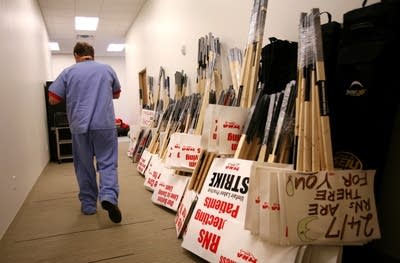Nurses and hospitals meet with federal mediators
Go Deeper.
Create an account or log in to save stories.
Like this?
Thanks for liking this story! We have added it to a list of your favorite stories.

Negotiators for Twin Cities nurses and 14 hospitals are meeting with federal mediators in an attempt to work out their differences over a new labor contract.
Hospitals and nurse leaders have shared few details about Thursday's negotiating session, which is being held in an undisclosed location. Both the nurses union and the hospitals have agreed to a media blackout.
Several mediators will be on hand to assist the parties in the talks.
It's the first time in three weeks that nurses and hospitals have come back to the bargaining table. Two previous sessions with federal mediators in early June did nothing to break the impasse over staffing, pay and pension issues.
Turn Up Your Support
MPR News helps you turn down the noise and build shared understanding. Turn up your support for this public resource and keep trusted journalism accessible to all.
The nurses voted in May to hold a one-day strike, which took place two weeks ago. On Monday, they authorized their negotiators to call an open-ended strike if an agreement can't be reached, but nurse leaders have said they will try hard to avoid another strike.
"As we stated prior to this week's strike vote, we have given our unilateral commitment that we will not give a strike notice as long as productive negotiations are continuing," the nurses said in a written statement released ahead of the talks.
The agency helping the nurses and hospitals resolve their differences is called the Federal Mediation and Conciliation Service, which was created in the 1940s with a mission to help improve relations between labor and management and to promote collective bargaining.
The agency invited both parties back to the table on Monday, as nurses conducted their second strike vote. By Tuesday, both sides had agreed to resume negotiations.
Both sides have resisted inviting the other side back to talks, so the federal agency's invitation likely sped up the process. But it isn't clear whether either side is willing to give up anything in the dispute.
Mediation two days before the strike was unsuccessful in avoiding the action by the nurses.
The situation could be different now that each side has had a chance to express their positions to the public.
For the nurses, the one-day strike was a chance to show that they are united as a group. And for the hospitals, the one-day strike was a chance to show that they could still deliver care to patients -- while the hospitals had fewer patients that day, they made it through the strike without any major problems.
It isn't known how long the negotiations will last. During previous mediation sessions, the hospitals and nurse leaders were placed in separate rooms and mediators shuttled between them to deliver messages.
The nurses have said they want firm staffing ratios -- one or two patients for each critical care nurse, and four patients per nurse in general medical and surgical floors.
Nurses have made that demand their top priority, but the hospitals have said repeatedly that the nurses must take that demand off the table. Hospital officials said they need flexibility in a changing health care climate.
"We are encouraged by the (union's) stated willingness to modify or drop any of their proposals. We hope this public declaration means that the union negotiators are prepared to set aside the national union's agenda on staffing ratios so we can focus on the issues that are relevant to health care in the Twin Cities region," the hospitals said in a written statement released Thursday.
The nurses also want a 3.5 to 4 percent pay increase, which the hospitals have said is too expensive at a time when they're trying to control health care costs.
(MPR reporter Elizabeth Dunbar contributed to this report.)
Dear reader,
Political debates with family or friends can get heated. But what if there was a way to handle them better?
You can learn how to have civil political conversations with our new e-book!
Download our free e-book, Talking Sense: Have Hard Political Conversations, Better, and learn how to talk without the tension.




